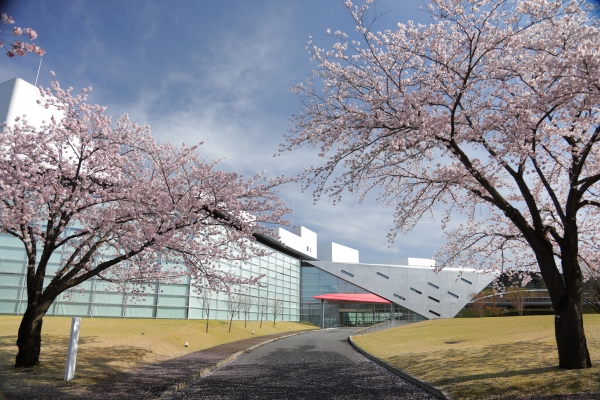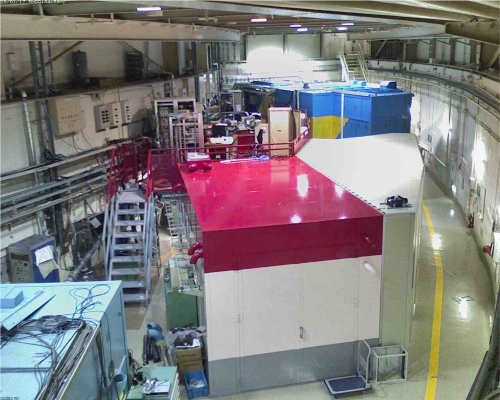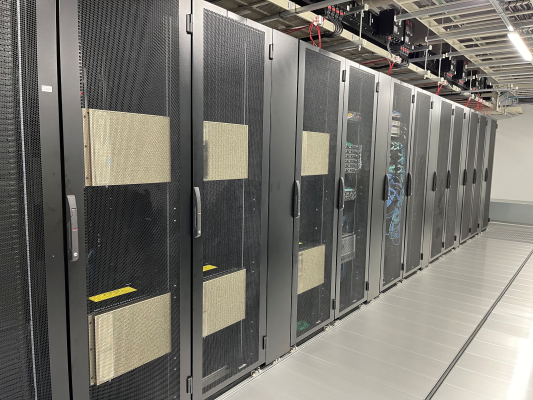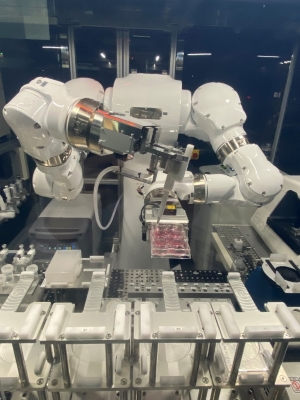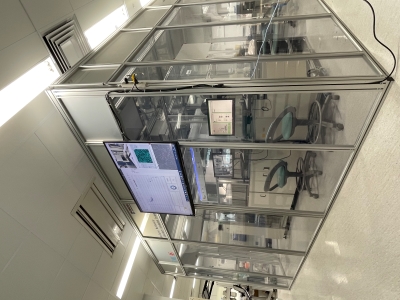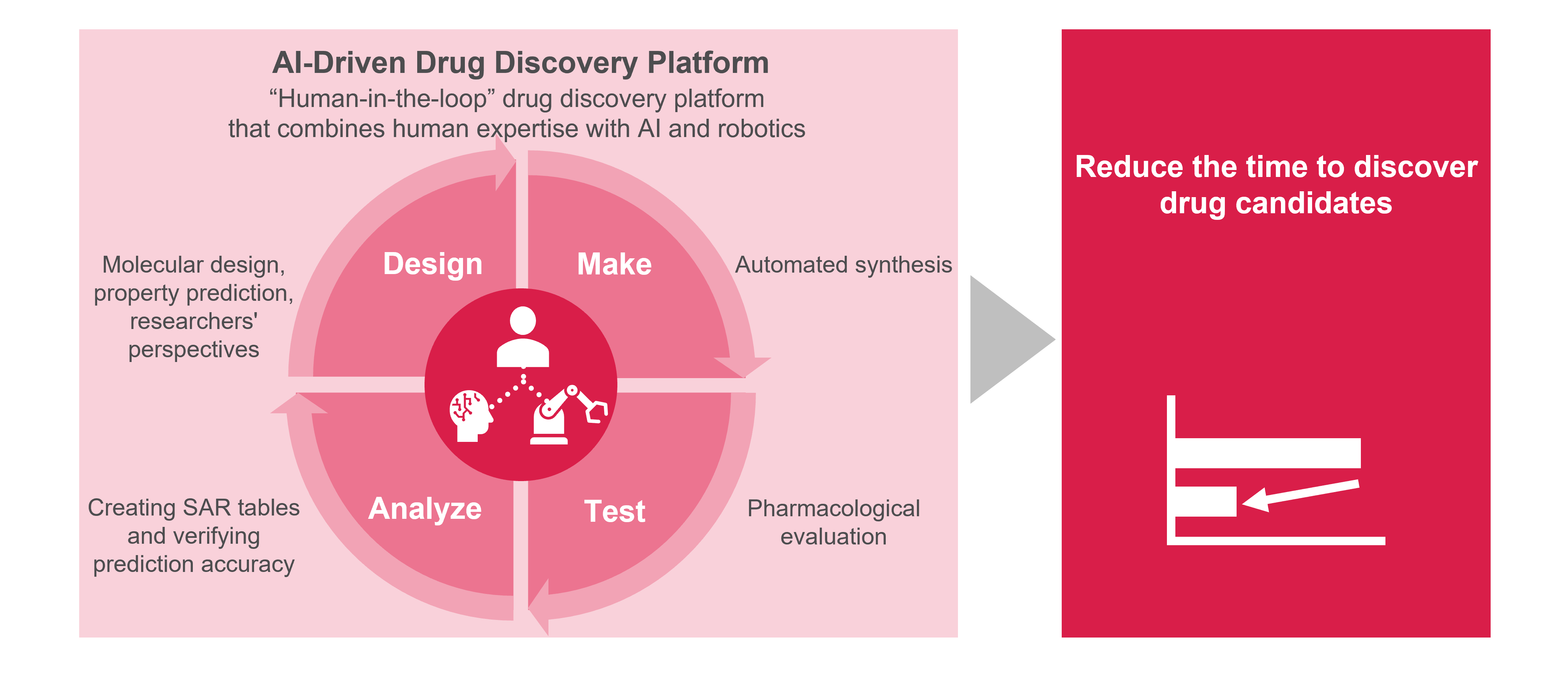Astellas is focused on developing a state-of-the-art research environment with the latest equipment and proprietary research platform technologies. We empower our team of renowned researchers in their pursuit of selecting targets and identifying drug candidates to expedite the creation of new drugs and enhance the probability of success.
At our largest research laboratory, Tsukuba Research Center in Japan, researchers have access to synchrotron radiation facilities for large-scale structural analyses, as well as TOKYO-1, one of the world's most advanced GPU supercomputers, enabling the calculation of vast amounts of data.
We are also building a platform to advance our drug discovery and assessment by integrating our own research platform technology with cutting-edge artificial intelligence (AI). Our Mahol-A-Ba platform combines a robot, an operating system for experiment equipment and AI to enable remote, automated cell-culture and assessment. Additionally, we have established a "human-in-the-loop" drug discovery platform that integrates AI and robotics into the process of identifying drug candidates, incorporating researchers' perspectives as necessary. These initiatives have led to a significant reduction in our research timelines.
Effective Research Environment for Compound Design
Astellas has a dedicated laboratory located at the synchrotron radiation facility of the High Energy Accelerator Research Organization in Tsukuba, alongside our own Tsukuba Research Center. This facility enables us to analyze more than 500 structures of protein-compound complexes annually and evaluate vast structural data. We use the TOKYO-1 system: a world-leading GPU supercomputer for simulations to predict compound activities and optimize their designs.
While leveraging these extensive and state-of-the-art laboratory facilities, Astellas brings together experts in various fields from around the world. This collaborative environment fosters daily discussions among researchers specializing in compound production, such as protein purification and medicinal chemistry, analysis and assessment, including structural analysis, assaying system construction and informatics. Within this research environment, we are dedicated to discovering innovative new drugs with more complex structures than traditional small molecules and antibodies, such as targeted protein degraders and bispecific antibodies.
Mahol-A-Ba, a Fully Automated Cell-Based Drug Discovery Platform
Dual-arm robots, initially developed to support factory production lines, have evolved through cutting-edge technological advancements. Astellas was the first private company in the world to incorporate the dual-arm robotics system Maholo into cell-based drug discovery research. We also launched Screening Station, a novel laboratory automation system and have seamlessly integrated these technologies with AI image analysis systems to develop the fully automated cell-based drug discovery system, Mahol-A-Ba. Like skilled researchers, Mahol-A-Ba has the ability to perform multiple complex experiments and observe outcomes at any time.
Researchers can fully automate the evaluation of differentiated cell activity and pharmacological effects, in addition to the cell culture and differentiation processes. This advancement enables remote operation, allowing research to be conducted globally, regardless of time or location. Mahol-A-Ba is a versatile platform, providing the flexibility to accommodate researchers’ specific needs and incorporate new assessments using advanced AI imaging analysis systems and deep learning of AI imaging analysis systems.
Our goals are to automate the entire process from cell therapy research to manufacturing to allow technology transfer, accelerating and enhancing the quality of drug discovery research and manufacturing. We have established Mahol-A-Ba at an external joint research facility to foster open innovation and to unlock new drug discovery opportunities, and have introduced the robotic component, control systems or AI of Mahol-A-Ba to multiple in-house facilities around the world.
[Reference] Astellas DX Strategy Series Vol.2: Drug Discovery Platform Integrating Humans, AI, and Robots
Read more
Synergizing Medicinal Chemists and AI: AI-Driven Drug Discovery Platform
In early drug discovery research, we identify hit compounds from a large-scale library that interact with the target protein or exhibit intended pharmacological effects. Using the structure of these hit compounds, we optimize their structure through cycles of molecular design (Design), synthesis (Make), pharmacological evaluation (Test), and structure-activity relationship (SAR) analysis (Analyze) - a process known as DMTA - to discover potential drug candidates.
Astellas has developed its own framework by integrating AI and robotics into every stage of the DMTA cycle, adding value through researchers’ ideas and perspectives. This innovative approach creates a "human-in-the-loop" drug discovery platform that combines human expertise with AI and robotics, thereby streamlining and accelerating the DMTA cycle. Consequently, we have successfully reduced the time from identifying hit compounds to acquiring preclinical drug candidates by up to 70% compared to our previous averages.
This platform provides comprehensive coverage of molecular design, property prediction, synthesis, evaluation and analysis. It includes functions for generating and designing molecular structures, recommending chemical reaction conditions using AI, and predicting various properties, such as pharmacological activity and pharmacokinetics for the generated compounds. It also includes automated synthesis and assay systems using robots, and tools for automatically creating SAR tables and verifying prediction accuracy with real evaluation data. These functions are in use, primarily in small molecule drug discovery. We are also exploring the potential expansion into more complex modalities, including middle and large-sized molecules.

